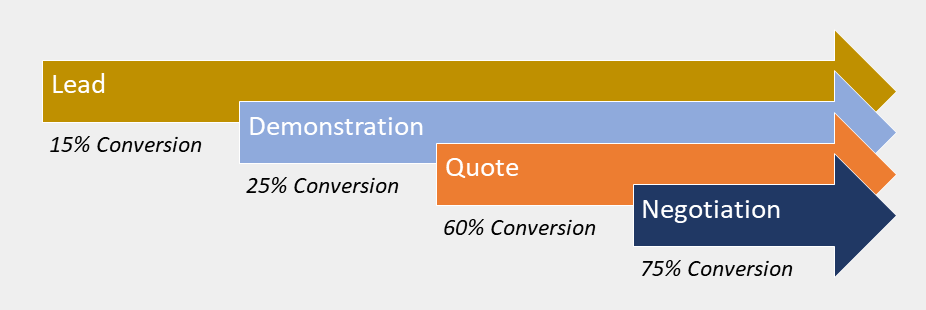This article is part 3 of the metrics mini-series on sales and marketing.
Why metrics matter for sales and marketing
Using metrics to assist sales
Operations in the sales department will depend on the size of the potential sales opportunities. When it comes to large deal sizes, the Account Managers or Sales Development Representatives (SDRs) approach potential B2B and B2B2C leads to entice them through the funnel. For smaller deal sizes, the sales department focuses on generic outreach.
In some companies, the sales department is also known as business development. We tend to use sales instead of business development as this term has a broader focus and meaning, which can be important for the delivered results.
Let’s use the example of the consultancy sector to see how, starting from the SQL metric, we can use metrics to monitor the effectiveness of the sales approach. These metrics include:Number of qualified meetings per time period with a qualified lead. This is usually monitored on a monthly basis.
Like in other sectors, companies in the consultancy sector use this to measure the effectiveness of their sales leads.

Conversion rate
The percentage of sales meetings that result in a deal. The higher the conversion rate, the more ground you can cover without increasing your advertising budget. Alternatively, you can reduce your advertising budget to save money in order to test new marketing tactics.
In addition to monitoring the results of sales meetings to see if a particular type of lead or meeting is more successful, consultancy companies can also use the conversion rate to check that they are generating the right type of leads and the effectiveness of their current sales tactics.
Pipeline
This is particularly useful for large deal sizes.
Sales directors use this information to alert the rest of the company about upcoming projects that need to be planned for. For consultancy companies, this helps with personnel planning.
Weighted pipeline
The value of transactions at each stage of the funnel as a percentage. Again, this is useful for companies with larger deal sizes.
This alerts the company about potentially quiet or busy upcoming periods that need to be planned for. With their high reliance on personnel, this is important for consultancy companies.
Closed won
A sales deal that has reached the final stage in your sales cycle. By marking the sale as closed, it removes it from the company’s funnel, allowing the sales team to move onto new potential sales.
In addition to focusing on the next upcoming sales when they close a successful sale, the consultancy company’s sales team can also learn from the sale by investigating what went well and how they can repeat it in the future.
Closed lost
The opposite of closed won. This is when a customer refuses to make a purchase from you. By performing a closed lost analysis, you can see what mistakes were made, why they were made, and how they can be improved in the future.
The analysis can help the consultancy company’s sales team to decide if their sales approach needs to be redirected and what changes are needed.
Orderbook
Orders are being added to the orderbook when a sale is confirmed. This means that the client has decided to choose for you product or service. The customer confirms to the sales team, on which the execution or delivery is planned. The invoice or formal contract will follow.
By tracking your orderbook, you can estimate how much of the sales target is already achieved for the upcoming periods.
Talk to the experts
Are you interested in discovering the difference metrics can make for your marketing and sales activities? Contact CFOrent for expert help on implementing metrics throughout your company.
This is the third article in a three-part blog series on metrics in marketing and sales. Click here to read part 1 on metrics and the marketing funnel and part 2 on metrics and the marketing funnel.
